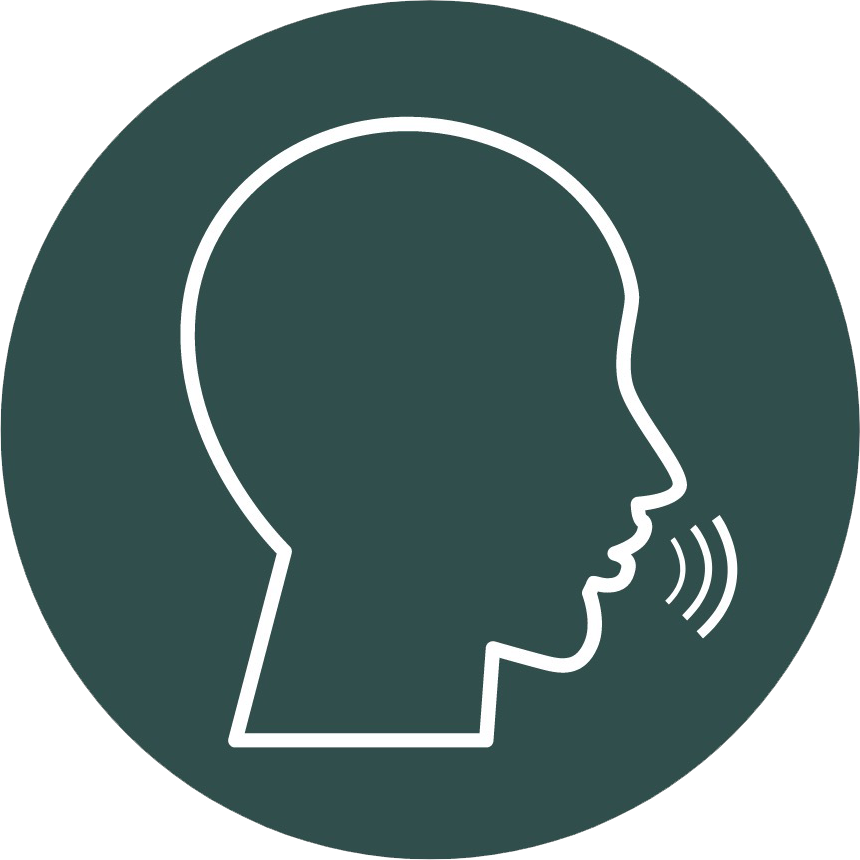Voice and Speech Therapy
Voice and speech therapy is an essential and specialized form of treatment that focuses on enhancing various facets of voice and speech production. This encompasses aspects such as articulation, fluency, resonance, and voice quality, all of which are integral for clear and effective communication.
This type of therapy is particularly beneficial for individuals experiencing voice disorders, which often involve issues with the vocal cords or larynx, leading to a hoarse voice or other speech impairments. It can aid those who have suffered from a stroke, brain injury, or conditions that affect speech, like Parkinson’s disease, multiple sclerosis, or developmental disorders. Additionally, it’s valuable for treating various speech disorders, ensuring that individuals can communicate more effectively and confidently in their daily interactions.
By working closely with a skilled voice therapist, patients can learn to navigate and improve their vocal and speech challenges, enabling them to express themselves more clearly and participate more fully in social and professional situations.

Voice and Speech
Benefits of Voice and Speech Therapy
Improved Communication
Vocal therapy assists individuals in enhancing their vocal abilities, focusing on aspects such as verbal expression and the clarity of spoken language. This treatment, often a key component of comprehensive voice therapy programs, is particularly beneficial for those facing challenges with their voice or swallowing. It aims to improve not only the strength and quality of the voice but also the ease of swallowing.
Vocal therapy integrates techniques to strengthen vocal cords and refine speech patterns, ensuring effective communication and a better quality of life for those who undergo this therapy. These programs are tailored to address specific vocal issues, providing targeted strategies and exercises that cater to the unique needs of each individual, thus promoting effective and lasting improvements in vocal health and function.
Increased Confidence and Self-Esteem
Struggling with speech and voice issues, such as problems with the vocal cords or voice box, can often lead to feelings of embarrassment or frustration, impacting an individual’s confidence and self-esteem. Voice and speech therapy focuses not only on improving the physical aspects of voice production but also emphasizes vocal hygiene, a set of practices to maintain a healthy voice.
By enhancing these skills, the therapy helps individuals feel more confident in their ability to communicate, reducing the emotional and social difficulties associated with speech and voice disorders. This comprehensive approach to treatment supports both the physical and psychological well-being of those experiencing speech and voice challenges.
Better Quality of Life
Effective communication is a crucial part of daily life, from expressing needs and wants, to building relationships, to participating in work or school activities. For individuals with voice and speech disorders, achieving this level of communication can be challenging. Addressing a voice disorder often requires specialized voice therapy techniques, which are designed to improve vocal function and speech clarity.
These techniques are tailored to each individual’s needs, focusing on the rehabilitation of the voice and speech mechanisms. By utilizing these specialized methods, voice therapy can significantly enhance the ability of those with voice and speech disorders to communicate effectively, thereby positively impacting their daily interactions and overall quality of life.
Voice Therapy: Recognizing the Sign You May Need Help
If you’re experiencing persistent hoarseness, difficulty with voice and swallowing, or a noticeable change in your voice quality, it might be time to consider voice and speech therapy. These symptoms can be indicators of various conditions, such as spasmodic dysphonia, a complex speech disorder, or the presence of vocal nodules. Changes in your voice, including strain or discomfort, can point to issues with your vocal folds, signaling a potential voice problem that should not be ignored.
Voice and Speech Therapy, a specialized area of language pathology, is designed to diagnose and treat these conditions. By recognizing these signs early and seeking the assistance of a qualified therapist, you can address these voice and speech challenges effectively, improving both your communication abilities and overall quality of life.
Do You Have a Voice Disorder and Need Treatment?
If you are experiencing issues with your voice and have questions about voice therapy, it’s important to seek appropriate treatment from a qualified voice therapist. Voice disorders can range from mild to severe and may significantly impact your daily life. A voice therapist can provide personalized therapy, guiding you through exercises and techniques designed to improve your vocal health. Whether you’re a professional voice user or someone facing voice difficulties in everyday communication, consulting with a voice therapist is a crucial step towards regaining a strong, healthy voice.
